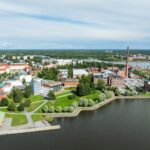Studying environmental science abroad
What is environmental science?
Environmental science is the study of the natural world and how humans interact with it. It looks at the physical, chemical and biological processes that shape our planet, as well as the challenges we face in protecting the environment.
This includes topics such as climate change, pollution, resource management and biodiversity conservation.
The subject draws on knowledge from biology, chemistry, geology and social sciences. As an environmental science student, you will explore how ecosystems function, how human activities affect the Earth and what solutions can create a more sustainable future.
Your studies might take you from laboratories to forests, coastlines and urban environments.
Why study environmental science abroad?
Studying environmental science in another country lets you see and experience nature in real life. You could stand beside a glacier as it melts, walk through a rainforest full of plants and animals, or see colourful coral reefs under the sea.
These experiences help you understand the planet’s problems in a way that books and classrooms cannot.
By learning in different countries, you gain a wider understanding of environmental challenges from multiple perspectives. You’ll also develop valuable skills in cross-cultural communication and form international connections with researchers, organisations and policy-makers.
What you will study
Environmental science degrees often combine classroom learning with hands-on experience. Key areas of study can include:
- Ecology and Ecosystems – understanding how living things interact with each other and their environment.
- Climate Science – studying the causes and impacts of climate change.
- Environmental Chemistry – analysing pollution, soil health and water quality.
- Geoscience – exploring Earth’s physical processes, from volcanoes to erosion.
- Conservation and Resource Management – finding ways to use natural resources responsibly.
- Sustainability Practices – designing systems that reduce environmental impact.
- Research and Data Analysis – collecting, interpreting and presenting scientific findings.
Many courses also include field trips, lab experiments, internships, or placements with environmental organisations and government agencies.
Related subjects you might also like:
- Marine Science
- Geography
- Ecology
- Renewable Energy
- Environmental Engineering
Articles related to agriculture, earth and environmental sciences
Accreditation
At undergraduate level, you may graduate with a Bachelor of Science (BSc) in Environmental Science or a related field such as Earth Science or Environmental Studies.
Some universities offer a Bachelor of Arts (BA) in Environmental Studies, which often combines environmental topics with policy, economics, or social sciences.
At postgraduate level, options include a Master of Science (MSc) or Master of Research (MRes) in Environmental Science, Sustainability, or Climate Change Studies. Specialisations may focus on areas such as renewable energy, environmental policy, or conservation. A PhD is typically required for advanced research or academic careers.
In some regions, professional accreditation is available for environmental consultants, environmental engineers, or sustainability specialists through recognised industry bodies.
Careers
A degree in environmental science can lead to careers in research, policy, conservation and industry. Some graduates work as environmental consultants, advising businesses and governments on sustainable practices and legal compliance.
Others become conservation scientists, developing and managing projects that protect habitats and wildlife. Many take on roles as environmental policy analysts, working with non-profits, government departments, or international organisations to shape laws and strategies.
You could also work as a climate change analyst, renewable energy specialist, or sustainability officer in sectors ranging from agriculture to urban planning. Research opportunities are available in universities, laboratories and environmental think tanks.
Beyond these roles, environmental science graduates may become educators, community outreach coordinators, or environmental journalists. The skills you develop are in demand globally, offering opportunities to work on projects that make a real difference to the planet.
Other subjects in agriculture, earth and environmental sciencesSign up to our regular email updates with advice on destinations, universities, scholarships and everything you need to prepare for studying overseas.
Sign up to our free emails now

